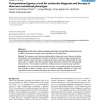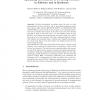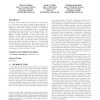112 search results - page 18 / 23 » Research on the Sheepdog Problem Using Cellular Automata |
118
Voted
BMCBI
2007
14 years 11 months ago
2007
Background: A finite state machine manipulating information-carrying DNA strands can be used to perform autonomous molecular-scale computations at the cellular level. Results: We ...
99
Voted
ACRI
2004
Springer
15 years 5 months ago
2004
Springer
We have investigated a problem where the goal is to find automatically the best rule for a cell in the cellular automata model. The cells are either of type OBSTACLE, EMPTY or CRE...
TACAS
2005
Springer
15 years 5 months ago
2005
Springer
Abstract. The automatic synthesis of programs from their specifications has been a dream of many researchers for decades. If we restrict to open finite-state reactive systems, th...
69
Voted
RECOMB
2001
Springer
15 years 12 months ago
2001
Springer
Protein-protein interactions play a central role in many cellular functions, and as whole-genome data accumulates, computational methods for predicting these interactions become i...
GECCO
2007
Springer
15 years 5 months ago
2007
Springer
In nature, systems with enormous numbers of components (i.e. cells) are evolved from a relatively small genotype. It has not yet been demonstrated that artificial evolution is su...



